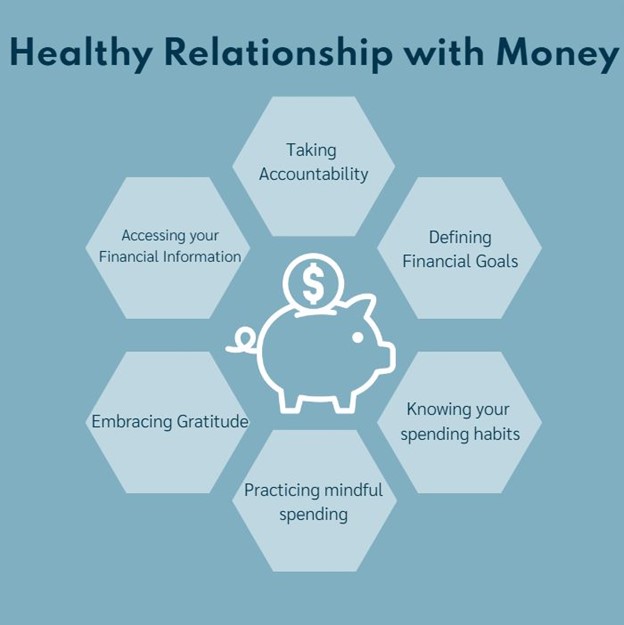What is Your Relationship with Money?

The four behaviors I see most with individuals and their money.
Written by: Ryan Bouchey, CFP ®, CPA
Working with clients through the years opens you up to many different experiences. It’s funny, early on in my career I always found myself doing all I could to work on my technical abilities and use “math” as the basis for most of the planning conversations. It was natural to me, and felt most appropriate as I was breaking into wealth management. It’s what I related to.
As time has gone on, my technical ability has strengthened with every planning conversation I’ve had, but something else happened. I don’t use the technical side as much. Of course, I use it when it can be of use to a client, but the technical and math equations have been replaced with a much more behavioral and emotional approach to planning discussions, with support from the math and technical side.
Forming good money habits is less about reaching for a specific number or goal, and more about your relationship with money. What is a relationship with money? It can come in many shapes and sizes. To reach the proper short-term and long-term goals in your financial life, I find it helps to identify one’s relationship with money to help them best achieve these goals. Without honing in on this relationship, it makes it hard to justify a purely math equation or a linear financial planning graph. It’s about setting proper frameworks and hitting the right emotional intelligence.
Through my own personal experiences and those working with clients, I felt it was possible to break the relationship with money out into four levels:
Scarcity
If it’s between clients who spend too much or spend too little, it’s the clients that spend too little who I often speak with most - naturally they are clients at or nearing retirement, have done a tremendous job saving to get to this point, but also feel somewhat nervous to spend and enjoy what they’ve worked hard for. I always share with clients like this - there’s just as much risk not spending enough as there is in overspending during retirement. Two totally separate risks with much different ramifications. But as I’ve learned through my time as an advisor, clients who spend too much can always cut back. Clients who don’t spend enough risk looking back at their life or retirement years with a boat load of regrets for not doing the things they wanted to do. A scarcity mindset will get you to retirement and your goals faster than most, however the risks are having regrets later in life for not doing more with what you’ve worked hard for. For those in this mindset, having a financial plan and finding balance is key to start breaking down the regret minimization framework.
I’m reminded of a Charlie Munger quote:
“I lived all my life with people who were into deferred gratification. In fact most of them will never have any fun. They just defer gratification all the way to end, that’s what we do. And it does cause you to get rich. So we’re going to have a lot of rich dead people”
As they say, you can’t take it with you!
Balanced
Watching a client move from Scarcity into a Balanced mindset is such a gratifying feeling as an advisor. From the client’s standpoint, when this happens, you can almost see the weight of the world lift off their shoulders. This type of evolution from scarcity to balanced comes through most often during a financial plan - usually with a new client. It’s not uncommon for this type of discovery process to happen with a couple who is not entirely on the same page when it comes to their relationship with money.
Oftentimes one spouse controls the finances and is the ringleader of the scarcity outlook. The other spouse tends to not feel as scarce, but you can almost tell they’ve never really had these conversations together before. When you discuss the risk of not spending with a new client, and they come back 6 months or a year later for a check-in, and share all they are doing - travel, more time with grandkids, spending on a new kitchen they always wanted - the positivity and excitement of these breakthroughs are an amazing thing to experience. Oftentimes this is where our value comes in - helping clients take control and enjoy what they have. A Balanced financial mindset is a great place to be.
Abundance
The Abundance mindset is most often associated, at least in my dealings, with the business owner / entrepreneur client - willing to take calculated risk and chances and always optimistic that things will work out. To me, this can correlate to the popular phrase in self-help today of a Growth mindset. Typically, this won’t pertain to a retiree, although it can, and most often it is with someone growing a business or their career while taking calculated chances to succeed.
They aren’t necessarily overspending, but they aren’t saving every penny for a rainy day. They are living life, enjoying life and most likely planning what’s next. If you are young and working - this money mindset can best serve you. It’s not easy to get to, and to be honest, one I’m personally working on. When executed properly these individuals seem to get the most out of life with typically the least amount of future regrets.
Reckless
This is Abundance on crack - maybe the term most associated with it could be YOLO (You Only Live Once). Fortunately, in our space we don’t typically deal with clients on this spectrum. I’m guessing they don’t feel the need for a financial advisor. What’s scary about this money mindset is that our current landscape - social media, trading at our fingertips - can exasperate these feelings.
While watching others get wealthy off crypto or the latest meme stock craze, psychologically it can be devastating to one’s finances. You want what your neighbor has, or what the latest twitter schill or Tik-Tok influencer is getting rich on. And not for nothing, but most of these people only share the trades that worked. Don’t discount that there may be A LOT of bad trades you aren’t seeing. Recklessness may create wealth, but typically won’t keep wealth. In this environment especially, be careful if you are trending in this direction. Our goal when working with clients is more about keeping them wealthy, and chasing the latest investment fad is the surest way to burning through wealth you should be trying to maintain.

Conclusion
The best place to start if you aren’t entirely sure where you fit in the money mindset spectrum - have a discussion with yourself, your family and consider working with an advisor. This is an important start to any financial planning discussion. Our number one goal is to align your wealth to what’s important to you and understanding your relationship with money can form the basis of this alignment.
It’s easy to show the math of a successful financial plan, it’s harder to get a client to see the big picture that there’s more to the math. This is the journey I’ve learned the most through my career and something that is incredibly rewarding to help clients get right. EQ and emotions can be a powerful thing, oftentimes more than IQ and the math.
If you think we could help you with any of the above, please reach out.
Bouchey Financial Group has offices in Saratoga Springs and Historic Downtown Troy, NY as well as Boston, MA and Jupiter, FL.